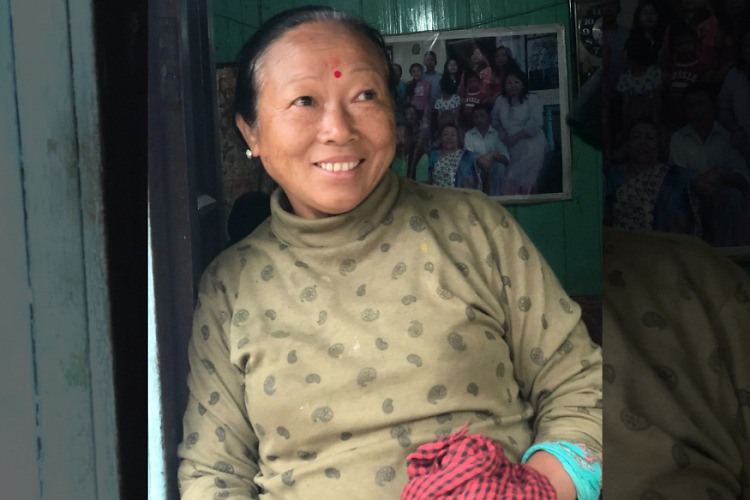
views
In every election, there are conversations and analysis on various factors that impact the results: caste, money, unemployment and agrarian crisis among others. In all of these factors, women appear as a footnote. Do women vote according to caste? What do they want from the government? Do they feel a woman politician is better for women? This series is an attempt to find out How Women Vote.
The keeper of a home that will never be her own, a worker in a garden without a keeper and in a country that refuses to accept her, Asha Pradhan (52) has grown wary of promises and polls.
The garden she works at the Kalej Valley tea garden near Ghoom in Darjeeling, along with Peshok and Dooteriah, is owned by TMC MP KD Singh’s Alchemist Group. Although not officially closed, workers in these gardens stopped receiving regular wages since 2016. The next year saw them abandoned by the management, as a fall-out of the 2017 Gorkhaland agitation. Singh is being investigated by the Centre and the state government for his alleged involvement in a ponzi scheme.
Tales of locked gardens and exploited workers are almost as ubiquitous as the gardens themselves. But what makes Kalej Valley different is that workers here have taken matters in their own hands, demanding that they form a cooperative to look after the garden. Last year saw workers disburse a bonus of 15.5 percent to its members, while the industry disburses a bonus of 15 percent.
Pradhan, the only woman tea garden worker who traveled to Delhi recently to be at the forefront of a protest, explained, "They (the tea garden management) claim that the 15 percent bonus was impossible to improve. We proved them wrong and next year we plan to improve this."
The workers at the garden had initially refused to participate in the polls. After promises from the Binay Tamang-led Gorkhaland Territorial Administration to address their demand of allowing the workers to manage themselves, the community exercised their franchise on April 18. With the bypoll for the Darjeeling Assembly to held on May 19, Asha Pradhan and others remain wary.
"Promises have been made by politicians. Not just in my lifetime...but also to my parents and their parents. Promises are cheap," she said.
Her ancestors first came to the garden in the 1920s when it was first opened. Tea, unlike coffee, doesn’t have a season. The bushes require constant maintenance and this, British planters realised, necessitated skilled labour to maintain the tea bushes, year after year. In Nepal, hungry for jobs, the British found an easy solution. Apart from their wages, they received houses - meant to provide minimal shelter - as a form of enticement. These houses - which generations have built upon, adding a wall here, a fresh coat of paint there - are inherited by the workers, but never owned.
Asha is among the million people whose lives are intrinsically, and seemingly irrevocably tied to the tea gardens of West Bengal. An estimated 1,000 people lost have their lives to starvation since 2002, claim activists. Here workers, technically, have always been free to leave their jobs, but as Pradhan asked, “This is our life, the tea garden. Like the tea bushes, we have roots here. Where else will to go?” she asked.

Houses that will never be homes
The 52-year-old scoffed on being asked about the government’s Ujwala Yojana to provide LPG connections to poor households. Crouched at the chullah in her two-room home, preparing a meal of fried egg, rice and curry made of vegetables from the garden for the 13 male members of the Cha Bagan Sangarsh Samiti (CBSS), the group fighting for the creation of a cooperative here, she said, “We don’t get any scheme here. Nothing. We work, and sometimes we get paid for it. That is it.”
Asha wasn’t exaggerating. In 1890, Advocate-General of Bengal GC Paul had written to the Indian Tea Association that the “coolie lines” at these gardens were “in no sense villages; they were part of the tea gardens or plantations” and those who “occupy these barracks…have no property therein” and were “merely temporary occupants”.
Asha and another 113 families, of which only 40-odd, continue to work at the tea garden have been temporary occupants for nearly a century. The Bengal Tenancy Act of 1885 - that gave ‘occupancy rights’ to those who’ve continuously lived somewhere for 12 years - wasn’t implemented here. Nor was the post independence Factories and Minimum Wage Acts of 1948, that set uniform minimum standards for workers, nor the CPI(M) government’s land reforms. Instead, a separate Plantations Labour Act of 1951 was set up, that in addition to firewood, food rations also mandated that it was the “duty” of owners to provide “necessary housing accommodation”. “But as it became clear that it would be costly to build the number of houses required, the plantation owners started asking for government subsidies,” said an official.
This adoption, of what Brown University anthropologist Sarah Besky referred to as the importing of the ‘kindly rhetoric of colonial plantation management’ into India’s constitution, effectively means that tea gardens like Kalej are islands, where neither the state nor the Centre exists.
She explained that ideally the houses required to be built and maintained by the plantation management - something that rarely, if ever, happens. Whether it is painting the house, or just growing vegetables outside, it is done by the families and “almost always by the women".
Gendered jobs and new risks
At the best of times, a plantation employs more women than men. Jobs remain gendered: men work with machines, in factories or with fertilizers. Women work with their hands, working or plucking leaves. Maintaining their houses, though acutely aware of inheritance isn’t ownership, isn’t paid. As a result, families have found that it is beneficial if at least one family member supplements the tea garden income with a job elsewhere.
Wages in tea gardens are given on the basis of kilograms of green tea leaf picked. Increased from Rs 9 per kilogram to Rs 25 per kilogram. Laborers carrying up to 90 kilograms of collected tea leaves get paid Rs 5 per kilogram carried. The minimum wage is yet to be fixed, in spite of repeated demands across the hills, strikes and clarion calls and promised by different political parties.
“I spent most of my bonus on trying to maintain the house. I grow the vegetables outside so that we have enough to eat…even if we don’t get paid,” she added.
But in the past few years, jobs in Darjeeling - like the rest of India - have shrunk. With tea gardens shrinking, migration has risen sharply leading to low paid jobs in hospitality or childcare in southeast Asia for women and the Middle East and construction or restaurant jobs for men in the Gulf.
Most of the women in the village have already left, said a 65-year-old retired tea worker. “We are not really sure where they work…or what exactly it is that they do. We just hope that they’re well.”
Nirnay John Chhetri, the founder of Mankind in Action for Rural Growth (MARG), an NGO that works closely with the police and the administration against trafficking said, “The migration abroad has increased tremendously and the tea garden populations are very vulnerable to the risks that come with it: exploitation, debt, human trafficking.”
According to one officer in the district administration, “no day goes by that I don’t verify a passport application”. The officer explained, “The quality of education in the Darjeeling hills has been better than other areas of Bengal. Most young men and women speak English and get jobs elsewhere…with no work in the tea gardens, this is very lucrative.”
But the police admitted that they had come across numerous cases of trafficking of women from the tea gardens. A police source explained that ‘trafficking agents’ would target women of Nepali origin, since it was easier to procure a fake Nepali passport. Exploiting the extreme poverty in these areas, the women are trafficked to Delhi, from where they travel to Gulf countries. “There is a high demand for girls from Darjeeling and the Dooars region of north Bengal. It starts with migration, but ends with slavery,” an IPS officer from Bengal told News18.com
With lunch polished off, the men from CBSS outside had begun discussing politics. Age-old issues of identity, newer threats of trafficking were punctuated with resigned sighs and angry retorts. Asha, meanwhile, had begun cleaning the dishes with a practiced air. A cat, presumably hers, had found itself a cozy spot near the chullah. After leaving a saucer of milk for the cat, she said, “What am I thinking while voting…honestly, I don’t know.”
After a brief pause, she added, “Caste, country, identity…this is all great. But our life is the tea garden. We have roots here, like the plants we pick. First, those sipping our tea have to give us our home…then everything else.”




















Comments
0 comment